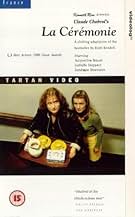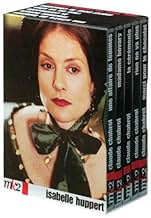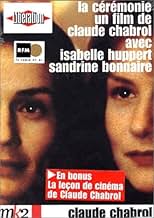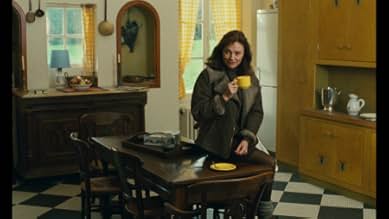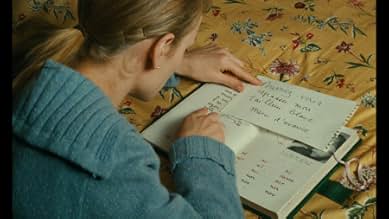VALUTAZIONE IMDb
7,5/10
14.745
LA TUA VALUTAZIONE
Una domestica di una ricca famiglia fa amicizia con un impiegato che la incoraggia a ribellarsi ai suoi datori di lavoro.Una domestica di una ricca famiglia fa amicizia con un impiegato che la incoraggia a ribellarsi ai suoi datori di lavoro.Una domestica di una ricca famiglia fa amicizia con un impiegato che la incoraggia a ribellarsi ai suoi datori di lavoro.
- Regia
- Sceneggiatura
- Star
- Premi
- 9 vittorie e 11 candidature totali
Recensioni in evidenza
I watched this on video without reading the plot summary on the video box (or the user comments here), and I highly recommend seeing it without knowing too much about the plot. It is a gripping, Hitchcockesque character portrayal that slowly builds great tension and a sense of foreboding. Let all the clever foreshadowing pique your imagination; the ending will be that much more effective.
Claude Chabrol, one of the leading lights of the French New Wave, faded into a series of unimaginative throwaway flicks and obscurity (peppered with moments of worthiness such as Blood Sisters )until storming once again into the limelight with this claustrophobic psycho-thriller adaptation.
Like Heavenly Creatures and Fun this film is anchored around the destructively intense relationship between two female leads: the apparently insipid family housemaid Sophie (Sandra Bonnaire) and the sparky but cumulatively obnoxious postmistress Jeanne (Isabelle Huppert). They both, it transpires, have potentially murderous secrets in their past involving the incineration of unwanted relatives (a child and a father). After a roundabout, deliberately vague "confession" to each other they erupt into childish laughter and it seems their relationship is cemented in their mutual utter lack of remorse.
There is no guilt felt by either woman for any of their crimes be it spite, neglect, theft, opening other's mail, arson or even murder. This is because, primarily though Jeanne's obsessive class angst and Sophie's obsessive paranois, they justify their stance and actions with an "us against them the world" self-righteous fervour. Jeanne describes all her - increasingly erratic - behaviour as "a good deed" and the equaly unstable Sophie believes her.
Every role is acted impeccably by some of the leading lights of French cinema. Along with Bonnaire and Huppert, arguably the best French actresses working today, Jacqueline Bisset plays the bourgeouse lady of the house for whom Jeanne works. She sees herself as a kind and understanding employer, providing glasses and a television for her taciturn domestic. However this gesture is interpreted as patronising by the illiterate Jeanne.
It's through minot details such as this that character exposition arises . The two principals are painted with tiny, finely detailed brushstrokes while everyone around them is painted with broad strokes. This intentional disparity brings us uncomfortably closer to the unhinged worlds of Jeanne and Sophie. Worlds which are revealed slowly, subtly and manipulatively.
La Ceremonie is based of a Ruth Rendell novel, "Judgement in Stone". Rendell is an archetypal British writer and I think that if La Ceremonie was a British film with British actors and a skilful British director it would have been a very different, darker and more disturbing movie. Having said this, Chabrol, with his distinctly French sensibilities and post nouvelle vague expertise brings other qualities to the story and makes this a remarkable film. Chabrol avoided darkness for the sake of it in favour of a highly sophisticated level of characterisation and build-up. The climax, however it was filmed, could never be anything less than shocking.
Ultimately la Ceremonie presents a pessimistic view of humanity: bleak, depressing and disturbing. Even Bisset's family don't come off well with their selfishly consumereist and blinkered middle class lifestyles.This and the high degree of audience manipulation means the film leaves a bad taste in the mouth but there's no denying it's an egregious work of art.
Like Heavenly Creatures and Fun this film is anchored around the destructively intense relationship between two female leads: the apparently insipid family housemaid Sophie (Sandra Bonnaire) and the sparky but cumulatively obnoxious postmistress Jeanne (Isabelle Huppert). They both, it transpires, have potentially murderous secrets in their past involving the incineration of unwanted relatives (a child and a father). After a roundabout, deliberately vague "confession" to each other they erupt into childish laughter and it seems their relationship is cemented in their mutual utter lack of remorse.
There is no guilt felt by either woman for any of their crimes be it spite, neglect, theft, opening other's mail, arson or even murder. This is because, primarily though Jeanne's obsessive class angst and Sophie's obsessive paranois, they justify their stance and actions with an "us against them the world" self-righteous fervour. Jeanne describes all her - increasingly erratic - behaviour as "a good deed" and the equaly unstable Sophie believes her.
Every role is acted impeccably by some of the leading lights of French cinema. Along with Bonnaire and Huppert, arguably the best French actresses working today, Jacqueline Bisset plays the bourgeouse lady of the house for whom Jeanne works. She sees herself as a kind and understanding employer, providing glasses and a television for her taciturn domestic. However this gesture is interpreted as patronising by the illiterate Jeanne.
It's through minot details such as this that character exposition arises . The two principals are painted with tiny, finely detailed brushstrokes while everyone around them is painted with broad strokes. This intentional disparity brings us uncomfortably closer to the unhinged worlds of Jeanne and Sophie. Worlds which are revealed slowly, subtly and manipulatively.
La Ceremonie is based of a Ruth Rendell novel, "Judgement in Stone". Rendell is an archetypal British writer and I think that if La Ceremonie was a British film with British actors and a skilful British director it would have been a very different, darker and more disturbing movie. Having said this, Chabrol, with his distinctly French sensibilities and post nouvelle vague expertise brings other qualities to the story and makes this a remarkable film. Chabrol avoided darkness for the sake of it in favour of a highly sophisticated level of characterisation and build-up. The climax, however it was filmed, could never be anything less than shocking.
Ultimately la Ceremonie presents a pessimistic view of humanity: bleak, depressing and disturbing. Even Bisset's family don't come off well with their selfishly consumereist and blinkered middle class lifestyles.This and the high degree of audience manipulation means the film leaves a bad taste in the mouth but there's no denying it's an egregious work of art.
10EdgarST
I don't know much about Claude Chabrol's cinema. I've seen seven or eight of his dozens of films, but I remember them quite well, especially "Violette Nozière", "Le boucher" and "La rupture." Many years after these, "La cérémonie" is a serene work, the construction of a mature man who avoids making artificial judgments or explaining motivations of his characters, and tending traps to his audiences to keep them interested in what he's narrating. In an economic way, with well-chosen details he gives us everything needed in a story that deals with psychological disturbances and profound social disparity. I do not see this movie as a thriller nor do I see the connection with Alfred Hitchcock. While Hitchcock could almost ruin his forays into psychological landscapes (like Simon Oakland explaining Norman Bates' behavior in "Psycho" or placing clues that led to nowhere) and very rarely treated social issues, Chabrol prevents from recurring to psychological clichés and gives us subtle gestures to illustrate the "class struggle": the way the rich daughter returns the handkerchief to the post-office clerk after cleaning her filthy hands; the way the post-office clerk throws back an envelope to the bourgeois father. A few times Chabrol is not so subtle and he shows tension even between persons of the same class: the way the poor maid and the post-office clerk despise the miserly charity of an old Catholic couple, the way the rich father protests when giving his son a ride to school... Using this strategy, all the portraits are compassionate: the members of the rich family seem as pleasant as the two poor women when they share the little they have. When the climax arrives -the daughter of the bourgeois family discovers (part of) the maid's secret and, in return, the maid reveals she also knows something about the young woman- there is little else Chabrol can add, but only guide us to the conclusion. Maybe it is a much too obvious cut from the two women with no food at home, to the dinner table where the rich family finished a tasty meal. But that's all we need, in case we want an explanation of the way the two women act in the last scenes. All the elements are there for us to find answers or make interpretations if we want to do so. Not too many filmmakers today treat audiences as intelligent human beings and invite them to participate in the creative process adding the absent information, with the benefit of more than a century of cinematic tradition and –if we care- reflections on the way things are today in imbalanced societies. When "La cérémonie" was over, I was very pleased: not only did I watch a movie directed with brains, but I felt treated with respect by Claude Chabrol. Not frequent in much of today's cinema, a respectful film has great merit.
The performances were fine, Huppert in particular was a lot of fun to watch, but the camera direction was awful, completely chilly and remote like the worst of Haneke's work. The remove and coldness, this intentional distance leaving room for judgment from the filmmaker (and the audience) rather than more fluid and closer shots encouraging closeness and empathy, really made the whole thing lackluster, at best. Also, there were some very heavy handed and poorly drawn moments used to bash us over the head with the weight of Sophie's secret. Having not read the source material, I'll reserve my opinions on the script, but it felt to me like a completely uninspired outing and can only imagine Chabrol took the job only for the money as he seemed to never find anything that interested him in the story.
Based on Ruth Rendell's Judgment in Stone, French auteur Claude Charbol transplanted this quintessentially English thriller about class and guilt to France, where he can fire more bullets at his favorite target - the French bourgeoisie. Without giving too much away, the story unfolds at a slow pace to reveal the class divisions and complex psychological issues that drive the characters' motivations. Centring on an illiterate maid, Sophie, who goes to desperate lengths to hide her "disability" from her employers, the wealthy Lelievre family, she eventually strikes a bond with the local postmistress who has mysterious grudge against her friend's employers. This film provided Chabrol with plenty of opportunities to criticize the disaffected bonhomie of the Levlievre family, but at times his presentation of some members of the Levlievres actually enlists our sympathy and therefore strikes a blow to the validity of his critique of French bourgeoisie values. Perhaps this was his intent to create more ambiguity than most psychological thrillers in this genre would allow. It's worth watching for the climax alone which has a delicious twist worthy of a mass-market Hollywood sequel.
Lo sapevi?
- QuizThe author Ruth Rendell has said that Claude Chabrol's version of her novel "A Judgement in Stone" is one of the few film adaptations of her work that she is happy with.
- Citazioni
Georges Lelievre: [referring, respectively, to Sophie the illiterate maid and Jeanne the nosy postal clerk] What a pair: one can't read at all, and the other reads our mail.
- ConnessioniFeatured in Isabelle Huppert: Message personnel (2020)
- Colonne sonoreCello Symphony
Composed by Benjamin Britten
I più visti
Accedi per valutare e creare un elenco di titoli salvati per ottenere consigli personalizzati
- How long is The Ceremony?Powered by Alexa
- Why is the film called La cérémonie? Is it because of the ending?? I know its based of a book so it might be more explicit in there.I'll try to look into it but I would appreaciate any feedback.
Dettagli
- Data di uscita
- Paesi di origine
- Sito ufficiale
- Lingua
- Celebre anche come
- The Ceremony
- Luoghi delle riprese
- Aziende produttrici
- Vedi altri crediti dell’azienda su IMDbPro
Botteghino
- Lordo Stati Uniti e Canada
- 873.196 USD
- Lordo in tutto il mondo
- 873.196 USD
- Tempo di esecuzione1 ora 51 minuti
- Colore
- Mix di suoni
- Proporzioni
- 1.66 : 1
Contribuisci a questa pagina
Suggerisci una modifica o aggiungi i contenuti mancanti

Divario superiore
By what name was Il buio nella mente (1995) officially released in India in Hindi?
Rispondi
![Guarda Bande-annonce [OV]](https://m.media-amazon.com/images/M/MV5BNzliMDEwMzYtMjg1NS00Mjc1LTkwNDktMzc1MmJkNDJjZDIxXkEyXkFqcGdeQXRyYW5zY29kZS13b3JrZmxvdw@@._V1_QL75_UX500_CR0)

